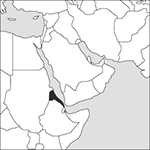
Source: MAPS IN MINUTES™ © RH Publications (1997)
Capital:
Asmara
Area:
117,600 sq km (45,406 sq miles)
Population:
6,233,682 (2013 est)
Currency:
1 nafka = 100 cents
Religions:
Muslim 50.0%; Eritrean Orthodox 24.0%; Roman Catholic 10.0%; other Christian 6.0%
Ethnic Groups:
Tigrinya 55.0%; Tigré 30.0%; Saho 4.0%
Languages:
Arabic, English, Tigrinya (all official); Tigré; minority languages
International Organizations:
UN; AU; Non-Aligned Movement
A country in north-eastern Africa, on the Red Sea.
Physical
Eritrea consists of a narrow coastal low-lying area and rises towards the Ethiopian plateau in the south. It is very hot and arid.
Economy
The economy has been badly affected by the war of independence and subsequent conflicts with Ethiopia and Djibouti. Agricultural products include sorghum, lentils, and vegetables, and there are food-processing, textile, and clothing industries. Subsistence agriculture is the main economic activity. Remittances from expatriates are important.
History
In 1869 Italy purchased the coastal town of Assab, and in 1885 began the occupation of the rest of Eritrea, which it declared a colony in 1889. It was from here that the Italians launched their disastrous campaign against Ethiopia in 1896, ending in their defeat at Adowa. Under British military administration (1941–52), a plan to join the Muslim west with the Sudan and the Christian centre with Ethiopia failed. Instead, the United Nations voted to make Eritrea a federal area subject to Ethiopia. In 1962 Emperor Haile Selassie declared it a province of Ethiopia and the Eritrean People’s Liberation Front (EPLF) then emerged, seeking secession. Fierce fighting between the EPLF and the Ethiopian regime continued through the 1980s. In February 1990 the EPLF captured Massawa, and in 1991, in an alliance with other Ethiopian rebel groups, the EPLF defeated the Ethiopian government’s forces. A transitional Eritrean government was set up by the EPLF and a referendum was held in 1993. Independence was approved by the referendum and was achieved later that year. The EPLF's leader, Isaias Afwerki, became the country's first President and in 1994 transformed the EPLF into a political party, the People's Front for Democracy and Justice. He has remained in power ever since, and Eritrea remains in a repressive single-party state. An intermittent border war was fought with Ethiopia between 1998 and 2000, and another with Djibouti in 2008.
- lockout
- lockout-tagout
- Lockportian
- lock range
- locks and keys
- Lockyer, (Joseph) Norman (1836–1920)
- Lockyer, Sir Joseph Norman
- locomotion
- Aëtosauria
- A’KF diagram
- B
- b
- B2B
- B2B market
- B2C
- B2G
- BAA
- Baader‐Meinhof gang
- Baade, Wilhelm Heinrich Walter
- Baade, (Wilhelm Heinrich) Walter (1893–1960)
- Baade–Wesselink method
- Baade’s Window
- Babakin Science and Research Centre
- Babbage
- Babbage, Charles